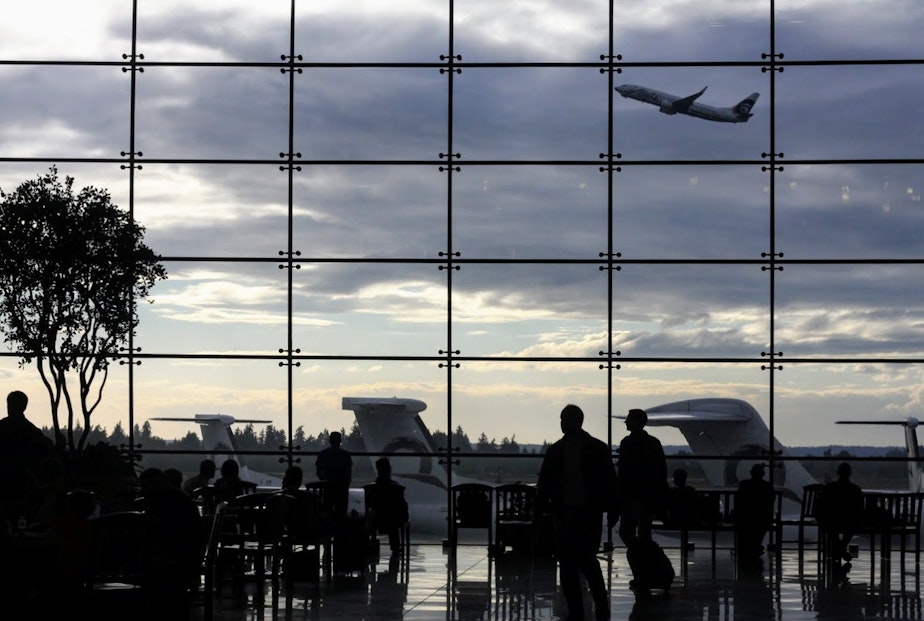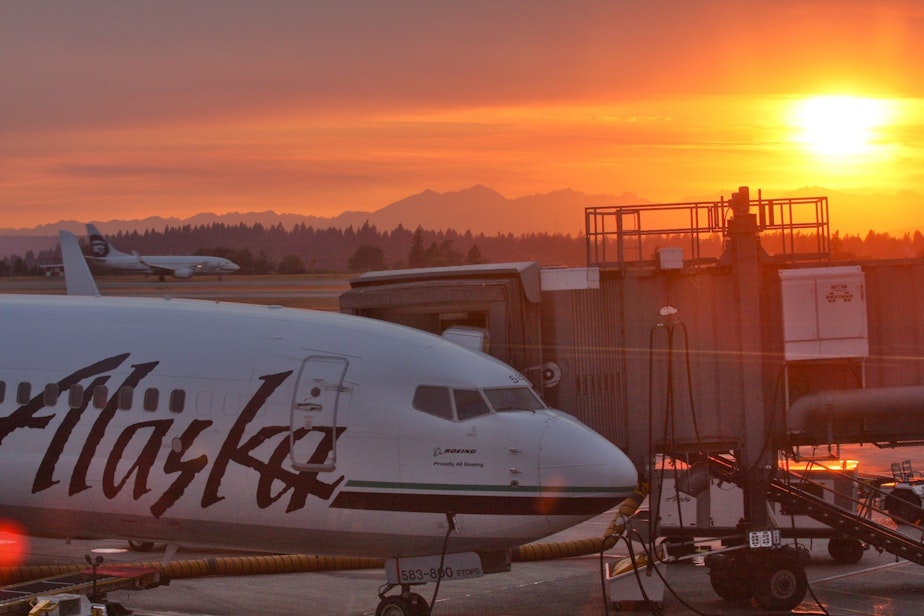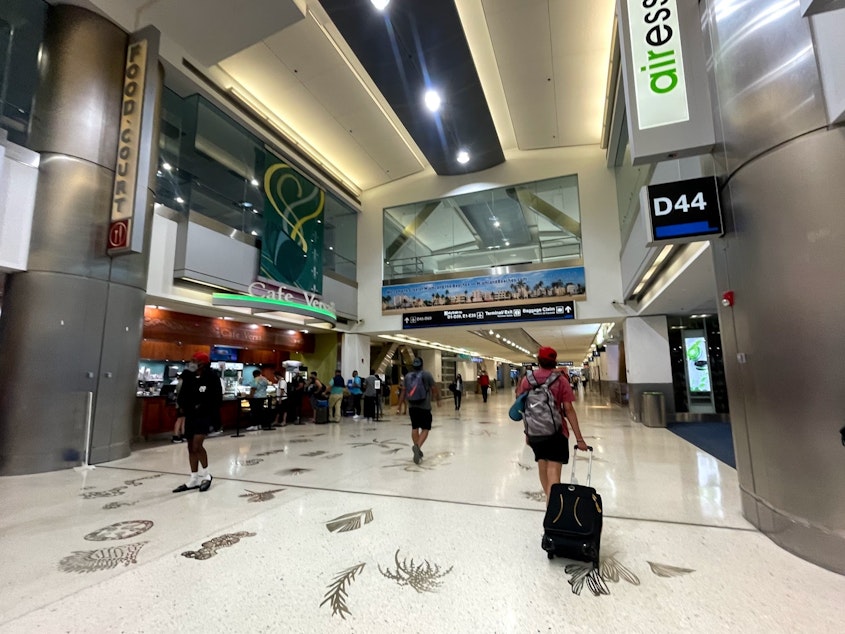Seattle Now: The summer of 'revenge travel'

If you tried to book a flight, or a hotel, or even a campsite this summer — you probably discovered people are doing a LOT of traveling.
There’s a phrase for this phenomenon — it’s called 'revenge travel.'
It's the reason why everything from flights to Maui, to a rental car in Seattle is extortionate right now. And it's also taking a toll on destinations like National Parks.
Seattle Now host Patricia Murphy sat down with Seattle Times travel writer Christy Karras to learn more about revenge travel and its impacts.
Sponsored
The transcript below has been edited for clarity.
Patricia Murphy: So, I was booking a plane ticket back east recently, and I was shocked at how expensive it was; it seemed like it happened overnight. One minute, the ticket seemed kind of reasonable, the next minute, it was ridiculously expensive. So expensive I didn't book — and I'm going to take that trip in the fall now. What is going on?
Sponsored
Christy Karras: A lot of people are calling it revenge travel. In a way, that's kind of an appropriate name for it, I think. People... just want to get out of the house. We feel we've been trying so hard, working so hard to do the right thing and stay home during the worst parts of the pandemic. And we're kind of over it. I mean, the pandemic is still happening, unfortunately. And that's a good thing to keep in mind. But we are over staying home so we're traveling wherever we can. And so this is kind of the summer of revenge.

Patricia Murphy: Now, the expense issue. Is this a supply and demand situation we're dealing with here? Why is everything costing so much right now?
Christy Karras: It's absolutely a supply and demand issue. Imagine what it's been like for all these travel-related businesses; to basically go from 20% of where they were, to 85% of where they were in 2019 — almost overnight. (It happened) as soon as restrictions opened everything up and eased up. A lot of it is the labor shortage, which we've heard a lot about. But also, planes were mothballed —so they have to bring those online. All these things are kind of happening all at once this summer.
Patricia Murphy: Right, interesting. And I wonder, all this expense for hotels and rental cars and gas — is it changing how people are traveling? Or are they just ready to throw cash at this?
Sponsored
Christy Karras: I think a lot of people are ready to throw cash at it. A lot of people saved — I know I saved — a lot of money over the last year and a half by not traveling. So people just squirreled away that money to some extent if they could, if they were still employed, which some people were not. But people who did stay employed had less to spend their money on (and) had fewer places to go. So they've been building up not only the demand for travel, but the money for travel. So yeah, people are saying "Whatever it takes, I'm going to make it happen."
We booked a trip to Scotland this fall and we booked our flights a couple months ago. And they were very inexpensive, they were very reasonable. If I wanted to book those now, I don't think that would be the same story. But we booked right before we knew they were going to be reopening — in the hopes that they would be reopening — because we figured if we waited until after they'd reopened things would be a lot more expensive. And they are.
Patricia Murphy: And you took a risk buying that ticket, banking on the fact that you would be able to take that trip. Which is something about revenge travel that I find interesting, it doesn't exactly sound relaxing Christy, it doesn't sound like "I'm so excited to plan my trip!"
Christy Karras: It doesn't! One great thing — and there are very few great things that have come out of the pandemic — but one great thing is that a lot of travel industries have become a lot more flexible. We made sure that we booked on an airline that did not include change fees for its tickets. So we knew if we had to change our flight, we wouldn't be paying extra fees for that. All the accommodations we booked had cancellation policies that allowed us to cancel without any penalty. So we were careful to make sure that if we had to, we could cancel everything and rebook at some other time.
Sponsored
And that's one thing I would tell people to make sure of: If they are booking travel anytime in the near future, to make sure that you look for those flexible options, because you may have to cancel. We might still have to cancel that trip to Scotland this fall, depending on restrictions. So it's good to be really flexible.

Patricia Murphy: Everything seems to be changing all the time right now, Christy. So you're right, taking precautions and guarding against the unpredictable environment is probably your best bet. Again though, does not sound relaxing to me.
Christy Karras: No, it's a lot of work. I think people can can still travel if they are flexible. And that's one thing I do want to emphasize.
Patricia Murphy: And honestly, that is the spirit of travel. Christy, I am a travel wimp. I have a very low threshold for crowds, people, delays. But there is a section of people who embrace the uncertainty and excitement of travel — and those people are in their element at this moment.
Sponsored
Christy Karras: Yeah. And perhaps not surprisingly, I am one of those people. So sometimes I don't book in advance; I don't have any lodging for the place I'm going. I'm one of those people... I go to a train station in Europe, and I jump on whatever train is leaving next. I don't know where it's going but it'll be someplace cool; it'll be someplace new. So that way, I don't have to decide. I don't have to plan ahead.
But I do think a big part of travel is the adventure part. Its going to someplace you're not familiar with and doing something new. So no matter what happens when you get there, it will be something different and new — even if it's not what you expected. I think it's great to embrace that and say, "Okay, well, at least we're doing something new. It's not exactly what we thought it would be."
And I do think a lot of people have been great about this, especially people with kids. You know, about helping kind of set the kids' expectations. "Yeah, we might have to wear masks where we're going." And, "You know, some things might be closed, but we're going to be together as a family and have a good time." So I think it's good to kind of focus on the positive. And travel is, I think, so good for us psychologically and emotionally. And it's not necessarily about where we go or what we do exactly — it's just about experiencing something new. I do like to think of it as an adventure and not something you should think you can control, because it's not something you can control all the time.
Patricia Murphy: And of course, the flip side is there are families that haven't seen each other in well over a year at this point. Grandparents who have not held their grandchildren. There are some very important gatherings taking place right now, and in some cases, these feel very urgent.
Sponsored
Christy Karras: Yeah, I agree. One thing that I would like people to think about — this is kind of my idea, I've been trying to get people to take me up on this idea — is the idea that just because the calendar says it's a holiday doesn't mean it has to be a holiday. There was a Thanksgiving when my family and I decided to do our Thanksgiving the week before Thanksgiving, and it was fantastic. It was one of the best Thanksgivings ever because the plane fares were cheap, the airport wasn't crowded, we could find all the food we wanted to eat. We were all able to make time for it in our schedule. It was fantastic, and it was so relaxed.
So I love the idea of maybe doing Christmas in July. The virus is — as we know — kind of seasonal, and it may very well get worse, unfortunately, over the upcoming holiday season. So maybe you plan to just have Christmas in July, or Thanksgiving in June, or whatever. The spending time with people you care about and the travel itself, those (aspects) are what's important.
Patricia Murphy: And with Covid restrictions, people are going outdoors more, meaning a lot of trash and crowds at national parks. Kevin Bacher works at Mount Rainier National Park, he told us we don't have a big trash problem like some other parks, but things are definitely different this year,
Kevin Bacher: Through June, we are having one of the busiest summers that we've had in the last about 40 years or so. Visitors are certainly having less of a wilderness solitude kind of experience.
Christy Karras: It's a good idea to think about the impact your travel is making on the place you're going and sometimes that impact is a physical impact on the landscape. Sometimes it's an impact on the people where you're visiting, or the economy, or whatever. So I think it makes it more meaningful to keep those things in mind.
Patricia Murphy: Well, and it's been so challenging for some places. The mayor of Maui has asked airlines to stop sending so many tourists to the island. What a nuanced challenge for communities that rely on tourism.
Christy Karras: It's been so difficult, and it's on the one hand, it's difficult for travelers. Because I would like to go to Mexico and support the Mexican economy and go support small businesses there, but I don't want to help drive up Covid cases there. But also, businesses wonder, "Should I open? Should I open fully? Should I require masks? Should I require vaccinations?" It's very difficult for people on both sides.
And I think maybe that's one reason we're seeing some folks get a little aggravated when they're traveling. You've heard those stories about people [on] airplanes. And I think people are are just feeling over being well-behaved because we've been well-behaved for so long. I think people are frustrated because there are more rules and everyone is trying to figure things out as they're going along. "Everybody's doing the best they can." That's one of my my mottos.
Patricia Murphy: And travel is an adventure.
Christy Karras: It is an adventure, yes. It might be an adventure where someone in front of you on the plane loses it in a really weird way. But, it is all part of an adventure. And, of course, as a writer, I always like to think there's no such thing as a bad experience, only good material for later. So you can think of it that way.
Patricia Murphy: Amen to that.
Christy Karras: This will be such a good story when I'm not in the middle of it!
Patricia Murphy: Christy Karras is a travel journalist in Seattle. Thank you for talking with me today.
Christy Karras: Thanks so much for having me! It was fun.




